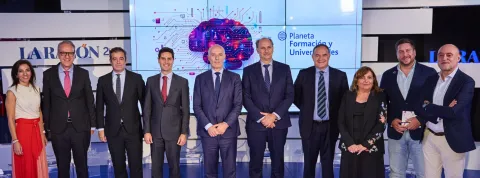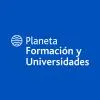
Planeta Formación y Universidades and GAD3 present the Barometer: Artificial Intelligence and the Employability of the Future
Artificial intelligence is becoming more and more integrated into our daily lives and its use is increasing exponentially every day, although with significant variations from country to country. The Barometer ‘Artificial Intelligence and the employability of the future for higher education students’, prepared by GAD3 for Planeta Formación y Universidades, analyses students' perception of the challenges, opportunities and consequences of AI in their professional future. A total of 2,400 higher education students between 18 and 35 years old from Spain, France and Italy, as well as Colombia, participated in the elaboration of this study.
The official presentation of the report took place yesterday, 26 September, at 19h, at the headquarters of La Razón (Calle de Juan Ignacio Luca de Tena, 17, Madrid). Thanks to the presentation by Narciso Michavila, the most relevant data and conclusions of the study were presented. This was followed by a round table with the participation of leading experts such as Montse Civera, Academic Director of Planeta Formación y Universidades; Segundo Piriz, Rector of UNIE Universidad; Jordi Marín, Senior & Executive Advisor specialising in Economics and Business; Luis González Gugel, Partner and Head of Intelligent Projects at Deloitte and Gonzalo Romero, Head of Google Education Spain, who, together with journalist Arantxa Herranz, debated the implications of AI for the future of employment. The introduction was given by Francisco Marhuenda.
Of all the students in the four countries participating in this study - directed by Narciso Michavila, president and founder of GAD 3 - around 60% say they use artificial intelligence tools at user level. Spain is the country with the highest adoption (65%), followed by Italy with 63% and Colombia with 60%, while France has the lowest adoption rate (55%).
This comprehensive analysis, based on the responses of 2,400 students from Spain, France, Italy and Colombia, sheds light on a number of key issues:
- A constantly evolving knowledge: while the use of AI tools among students is becoming increasingly common, there is a wide disparity in the depth of their knowledge. The study reveals that while the majority of respondents interact with AI on a daily basis, only a significant percentage have received formal training in this area.
- Opportunities and challenges: AI is seen as a double whammy: on the one hand, it offers huge potential to increase productivity, automate repetitive tasks and generate new jobs; on the other hand, it raises fears about job losses and the need to acquire new skills.
- Education, key to the future: Students see digital competences and critical thinking skills as essential to cope in an increasingly technological working environment.
What does this mean for the future? The report presents a scenario full of challenges and, therefore, also full of opportunities for Grupo Planeta's higher education division. Educational institutions, businesses and governments must work together to ensure that young people are prepared to make the most of the potential of AI.
You can consult the Barometer here.
